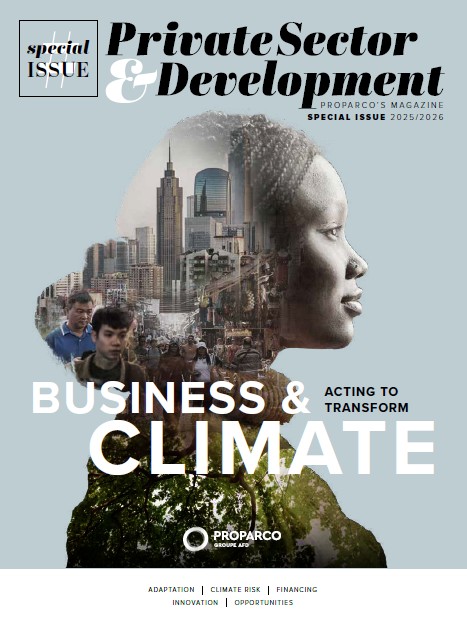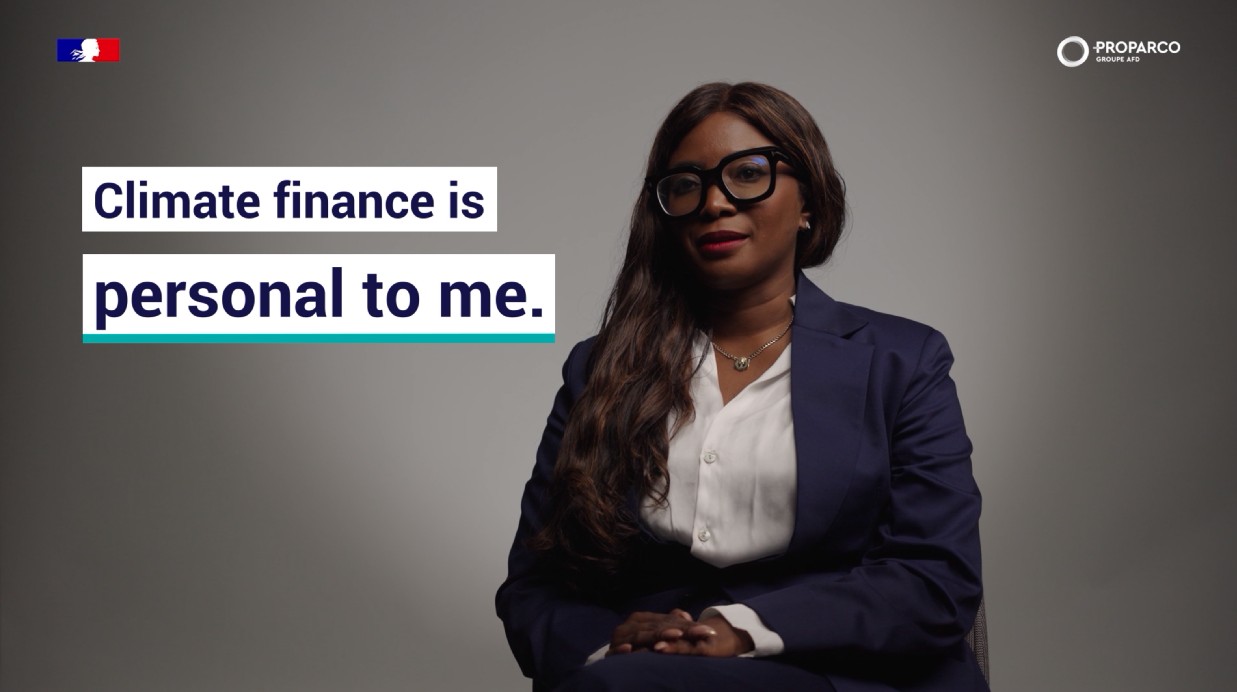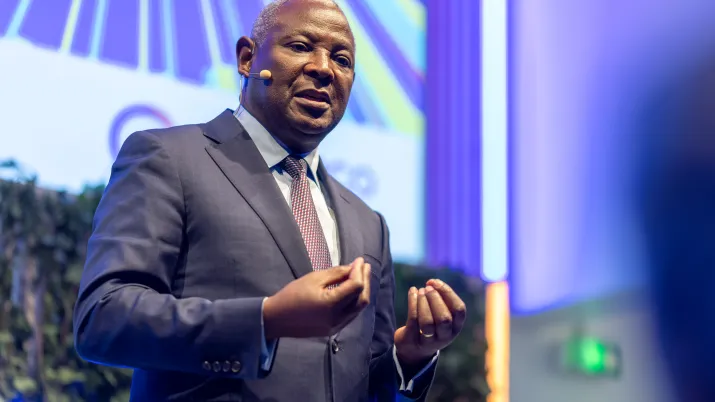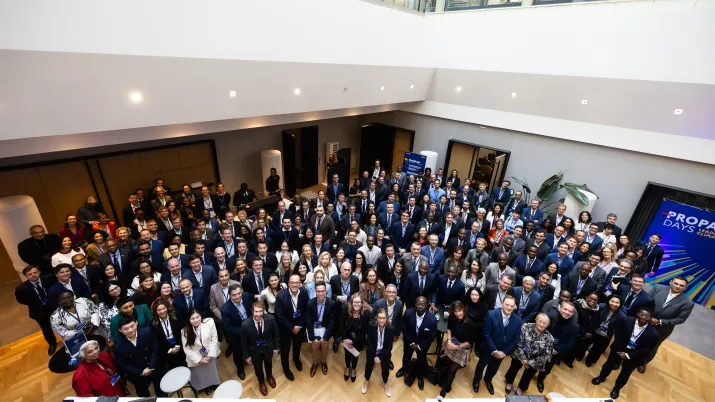Share the page
Where climate risk meets opportunity: how Ecobank is financing Africa’s future
Published on
Rachael Antwi Group Head of Sustainability Ecobank


Private Sector & Development - Business & Climate: Acting to transform
Proparco has published a new edition of its Private Sector & Development magazine, focusing on the strategic role of the private sector and financial institutions in tackling the climate emergency.
Most banks treat climate as a problem to manage. Ecobank treats it as intelligence to leverage. Across 35 African markets, the banking giant is embedding climate data into every credit decision, sovereign assessment, and investment choice—not to tick compliance boxes, but to identify where capital can work hardest. The result is a new breed of banking: one that profits from resilience, scales with sustainability, and turns Africa’s climate vulnerabilities into competitive advantages.
How is Ecobank embedding sustainability and climate strategy in its core business model?
We’re fundamentally reframing sustainability—moving it from a compliance checkbox to a strategic driver of how we assess risk and deploy capital across Africa. This isn’t about layering climate considerations on top of traditional banking; we’re redesigning how banking operates. We’re embedding climate risks in every credit, sectoral, and sovereign assessment we make. Our lending decisions actively reflect these risks, ensuring capital flows toward more resilient sectors and projects. We’re architecting Group-wide systems and strategies underpinned by climate pathways, supported by technology that enables delivery at scale.
Our digital infrastructure allows us to screen climate transactions and conduct risk assessments automatically, while providing science-based training and developing climate-adjusted financial products. But sustainability isn’t just being embedded in our frameworks—it’s being woven into daily decision-making across all levels of the organization.
Beyond our internal operations, we’re playing a regional leadership role across West and Central Africa, supporting large-scale climate finance transactions, and mobilizing blended capital aligned with Africa’s development goals. Ultimately, we’re rewiring how financial systems operate in Africa—with climate driving both smarter risk management and creating entirely new sources of value.
How has Ecobank integrated this reframing of sustainability and climate strategy into its corporate governance, including engaging teams?
The key is that climate factors aren’t isolated within the Sustainability function—they’re integrated into credit, risk, and business decisions across our pan-African network. This represents a fundamental shift in how African banks operate. We’ve hardwired climate accountability directly into our governance structure, starting at the top. Our Board’s Committee for Sustainability meets quarterly with formal oversight of climate risk and sustainability strategy, reviewing structured reports on portfolio exposures, sustainability-linked targets, and regulatory compliance metrics.
At the executive level, climate responsibilities are mainstreamed across all functions—not siloed within sustainability. We’ve developed a comprehensive suite of Group-wide policies, including our updated Climate Strategy and Exclusion Framework, that clearly define ownership, decision rights, and escalation pathways. We’ve directly linked these frameworks to operational processes: 100% of our transactions above $5 million now undergo climate screening, while credit committees and lending decisions systematically incorporate climate risk assessments. We track performance through specific KPIs—including climate risk screening ratios, green portfolio targets, and transition finance volumes—with real-time visibility through central dashboards that senior management reviews monthly
This has unleashed our ability to reduce approval times for green transactions by 30% while mobilizing climate-aligned capital faster and structuring more resilient transactions throughout our African operations.
What concrete methods does Ecobank deploy to identify, assess, and mitigate climate risks in its portfolio and operations?
We’ve built a multi-tiered risk assessment framework that distinguishes between physical and transition risk drivers across our entire portfolio. This starts at origination with transaction screening, includes sector-specific environmental and social risk scoring, and integrates into our evolving risk models.
Climate scenario analyses are being incorporated into our sovereign and sector risk models. We’re running early stress tests—1.5°C and 4°C scenarios—for energy and agri-finance in West and Central Africa to identify vulnerabilities around fuel subsidy reforms, carbon pricing, and drought cycles.
Our climate risk dashboards and heatmaps allow risk managers and business teams to visualize exposure and track early warning indicators in real-time. For mitigation, we’re linking transactions to sustainability outcomes that reflect borrowerlevel climate exposure. Recent deals in Ghana, for example, include pricing incentives for emissions reductions and gender outcomes—aligning financial risk with impact metrics. This integrated approach enables us to proactively manage emerging risks and reduce credit losses, thus expanding our sustainable finance portfolio.
The Harambee Way – Ecobank’s climate roadmap
The Harambee Way is Ecobank’s climate philosophy – our commitment to delivering a just, inclusive, and science-aligned transition across the African continent. It brings together three core pillars: climate risk integration, climate finance mobilization, and sustainability stewardship. “The Harambee Way is how we approach climate – not just as a risk to manage or capital to deploy, but as a shared journey, explains Rachael Antwi.
“We’re embedding transition into the architecture of African banking – from sovereign risk to loan structuring – powered by our ECO Framework for Climate Alignment.”
Harambee, a Swahili word meaning “all pull together”, symbolises unity, collective effort, and progress. It holds deep cultural significance across East Africa, particularly in Kenya, and reflects Ecobank’s identity as a pan-African institution.
What innovative tools or approaches are you using to overcome challenges in implementing the climate action plan?
We’re leveraging digital innovation to create operational efficiencies from climate intelligence. At the core is our proprietary ECO Framework for Climate Alignment (EFCA), which integrates climate vulnerability data into our risk models with comprehensive scenario analyses.
Our transaction screening is now fully automated with embedded climate parameters, while our climate-adjusted pricing models are being developed to simulate credit risk under different scenarios, demonstrating the clear value of early climate action to clients.
We’re also co-developing climate-linked insurance and finance products for agriculture and other vulnerable sectors, using granular climate risk data to inform design.
Looking ahead, we’re deploying AI-driven tools for climate scenario modeling and automated disclosure across our operations. These innovations are accelerating our shift from commitment to execution, improving credit quality, de-risking portfolios, and expanding access to climate-aligned finance.
Ecobank received from Proparco and other DFIs a sustainability-linked loan, a first for the region. Is this offering consolidating the bank’s climate objectives within its strategy, and are benefits being seen?
Absolutely. In 2023, we closed the first sustainability-linked loan for a financial institution in sub-Saharan Africa—a €200 million transaction that’s proven to be both a financial and institutional game-changer.
The deal, arranged by Proparco and a consortium of DFIs, directly ties our interest rate margins to independently verified climate KPIs. But equally important is the accompanying technical assistance program that’s helping us embed climate governance reforms across the entire bank.
The structure has created concrete accountability. We’ve committed to publishing a comprehensive Group-wide Climate Disclosure Report covering green lending, carbon-intensive exposures, and physical climate risk assessments. We’re also finalizing our full Climate Strategy, including financed emissions targets, decarbonization pathways for high-emitting sectors, and an exclusion policy for thermal coal.
The benefits are already visible. This framework has reinforced client trust, deepened our engagement with both sovereigns and corporates, and positioned us to significantly expand climate-aligned lending. Perhaps most importantly, it’s created a replicable model for other African banks—showing how performance-linked finance can drive real institutional reform tailored to our continent’s banking context.
What other specific initiatives or products is Ecobank developing to significantly increase its climate-related financing?
We’re moving beyond policy to implementation with our Sustainable Finance Framework, which directly links climate objectives—emissions reduction, renewable energy—with our lending and investment decisions. Our most notable initiative is in Ghana, where our Green Climate Fund accreditation enabled us to launch the Accelerating Solar Action Programme (ASAP)—a $31 million financing facility for photovoltaic systems. We’re targeting households, agricultural cooperatives, and SMEs, expanding access to clean energy while supporting job creation, local solar value chains, and climate resilience.
What makes ASAP significant is that it’s delivering at scale where many clean energy transitions stall at the planning stage. We’re accelerating diagnostics across our network to identify similar scalable opportunities in markets where national policies and sectoral demand align with our sustainable finance strategy.
These initiatives fulfill our ESG obligations while opening new revenue channels in decentralized energy systems, SME finance, and resilience-focused lending. By aligning our balance sheet with climate outcomes, we’re improving our competitiveness while building Africa’s green finance ecosystem.
How does the technical assistance provided by Proparco and its consultants help strengthen your internal capacities and accelerate climate actions?
Proparco’s partnership has been transformational - it’s helped us turn climate ambition into concrete action. Their technical assistance has enabled us to develop a comprehensive Groupwide Climate Strategy, enhance our credit risk assessment tools, and integrate climate considerations directly into our product design and investment decisions.
The training and expertise they’ve provided has been particularly valuable. Our teams across our network now have the skills to properly assess environmental risks and identify emerging green finance opportunities - capabilities that simply didn’t exist at this scale before.
The multiplier effect is clear: these internal gains are enabling us to originate green transactions at scale, align our capital flows with national and regional climate objectives, and help shape Africa’s broader climate finance landscape. What started as technical support has become institutional transformation, positioning Ecobank to lead capital mobilization for an inclusive climate transition.
Are there challenges in recruiting individuals with sustainability and climate-related skills?
Absolutely. Africa has a critical shortage of climate professionals who combine academic training with practical experience. For Ecobank, this is especially challenging given our need for multilingual specialists across 34 markets in English, French, and Portuguese-speaking countries.
Demand has intensified as climate becomes central to business strategy while the talent pipeline remains thin. We need professionals who can navigate diverse regulatory environments and deliver sophisticated sustainability solutions at scale.
So, we’ve adopted a decentralized approach, building capability internally through secondments, mentorships, technical training, and real-time learning via live transactions with business units and development finance institutions. All key staff are trained in climate risk and finance to ensure consistent application of our policies. While the external talent shortage remains a significant challenge, we’re not waiting for the market to catch up—we’re investing in our people to build the expertise we need.
Ecobank’s five-step climate action plan
- Set the ambition: define clear, time-bound climate goals, aligned with international frameworks (e.g. Paris Agreement, NGFS, SBTi).
- Build the intelligence base: establish climate data systems – financed emissions baselines, scenario analyses, and physical risk mapping – across sovereign, corporate, and retail portfolios.
- Integrate into governance and risk: embed climate into credit, enterprise risk, and capital allocation frameworks. Ensure accountability at Board, Executive Committee, and operational levels.
- Mobilise climate-aligned capital: develop sustainable finance instruments, internal taxonomies, and incentive mechanisms to shift financing toward low-carbon and climate-resilient sectors.
- Track, report, and adapt: implement systems for climate-related disclosure (e.g. Task Force on Climate Related Financial Disclosures, IFRS S2), impact measurement, and feedback loops to refine strategy and meet stakeholder expectations.
To go further
Voices for Change - Rachael Antwi, Ecobank
In this Voices for Change episode, Rachael Antwi, Group Head of Sustainability at Ecobank, shares how one of Africa’s largest banks is turning sustainability into action — financing green innovation, ...
Published on November 6, 2025





